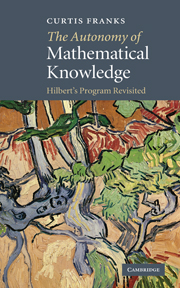6 - Autonomy in context
Published online by Cambridge University Press: 07 January 2010
Summary
THE NATURALISTIC TURN
Recent philosophical writing about mathematics has largely abandoned the a priorist tradition and its accompanying interest in grounding mathematical activity. The foundational schools of the early twentiethth century are nowtreated more like historical attractions than like viable ways to enrich our understanding of mathematics. This shift in attitudes has resulted not so much from a piecemeal refutation of the various foundational programs, but from the gradual erosion of interest in laying foundations, from our culture's disenchantment with the idea that a philosophical grounding might put mathematical activity in plainer view, make more evident its rationality, or explain its ability to generate a special sort of knowledge about the world.
Three examples of influential philosophical programs illustrate this general trend. Penelope Maddy's description of mathematical naturalism has drawn so much attention and approbation not because it rests on a refutation of “first-philosophy” approaches to mathematics, but because it quietly leaves those approaches behind. By instead explaining the philosophical significance of methodological problems that arise internal to mathematical practice and taking seriously the principles that mathematicians follow to address them, she has tapped into a concern native to mathematics. Her conviction that mathematics “should not be subject to criticism, from, and does not stand in need of support from, some external, supposedly higher point of view” stems from an assumption that an enriched understanding of mathematical activity will more readily arise from a close look at that activity than from measuring it against some other standard ([1997], p. 184).
- Type
- Chapter
- Information
- The Autonomy of Mathematical KnowledgeHilbert's Program Revisited, pp. 169 - 199Publisher: Cambridge University PressPrint publication year: 2009



